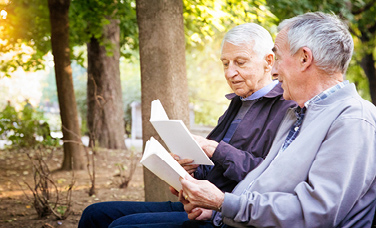
Four positive trends from 2020 to help you live and age well in retirement
Retirement Income
1. Australians have shown resilience during the pandemic, particularly older Australians
For most of us, the pandemic brought about rules and restrictions that significantly changed our day-to-day lives. The freedom and choices we were all used to, seemed to disappear in the blink of an eye.It’s no wonder that 70% of Australians have said they have never experienced this much change in their lives before. But it’s older Australians who are showing the greatest resilience, with younger generations more likely to struggle to find anything good about 2020.
Research from McCrindle suggests that the behaviours of older Australians in their response to COVID-19 may be making them more resilient. Australians aged 75+ are significantly more likely to have acknowledged the realities of their circumstances, to have kept in perspective that even in the uncertainty they know the dark days will pass and let advice from experts inform their decisions.
Overall, Australians have adopted a positive attitude during 2020. Almost nine in ten (89%) of people looked for the good and what they could learn from their experience in 2020, while four in five (83%) believe that although 2020 has been tough, they will come out stronger because of this experience. Research by Pureprofile shows that 2020 has also made us appreciate the simple things in life, and take less for granted, with 50% of people surveyed saying they have become more grateful for what they have since the pandemic began.
Being grateful has been proven to improve our wellbeing and increase our feeling of happiness. It helps us feel more positive, improves our health, our ability to deal with tough times, and it can also help us build stronger relationships. Finding ways to express or feel gratitude in everyday life is a great way to stay resilient in retirement.
2. We’ve looked out for each other and shown kindness
Tough times have also brought out the best in us. We were reminded about the importance of community and donating our time to help out those in need. Studies have shown that over half (55%) of people feel more compelled to show kindness to others since the pandemic. These simple acts of kindness have included checking in on neighbours, supporting local businesses and showing appreciation for essential workers.
Volunteering our time has benefits that go beyond the communities we help. People who volunteer actually experience a boost in their mental health. Research shows that volunteers are more satisfied with their lives and rate their overall health as better than those who don’t volunteer. This is good news for Australians aged 55 years who contribute a staggering $74.5 billion each year in unpaid caring and voluntary work.
With potentially more time on your hands, retirement can be a golden opportunity to make positive changes to your lifestyle and routine - and boost your wellbeing in the process. In this article, we share more about the benefits of staying active and connected to your community.
3. We’ve had time to take stock and re-prioritise what’s important in life
One of the benefits of having more time and less options is having space to think about what’s most important in life. While 88% of Australians will be happy to close the door on 2020, three quarters (76%) want to reprioritise how they spend their time. With social distancing to deal with, spending time with family and friends both near and far became one of our top priorities. Research from the Australian Institute of Family Studies found that even though many Australians (37%) found it difficult to connect with family members living elsewhere, almost everyone (93%) made the effort. And it wasn’t only video calls that kept us connected. Instant messaging and phone calls were the most common forms of contact for retirees.
Staying socially connected during a pandemic has its benefits, including lower levels of distress and symptoms of fatigue. Even in ‘normal’ times, these strong social connections can help to buffer us against negative physical and mental health outcomes and promote our resilience. Finding ways to stay connected to close friends and family in retirement is an important part of living and ageing well.
4. We’ve pivoted to spending less and saving more
For some Australians, coronavirus has also had a positive impact on our finances. Many of us have cut out life’s unnecessary expenses and learnt to live on a bit less. In a recent survey, 50% of people said they planned to change their lifestyles after the pandemic, with a view to spending less and saving more.
It turns out that the pandemic has also made us mindful about where we spend our money. Shopping with companies who are behaving sustainably has become more important to 50% of Australians because of coronavirus.
Retirement income to help you live and age well
While many of us would have liked 2020 to look a little different, 87% of Australians think that the pandemic is a good opportunity to change how things are done.
Rethinking your retirement income is one way you can support a positive outlook in retirement. We’ve seen just how quickly and unexpectedly things can change - a lifetime annuity can give you a regular monthly income, no matter how long you live.
Find out more about lifetime annuities here or use our Retire with confidence tool to learn how a comprehensive retirement income plan can support a positive outlook in retirement.
Stay up to date on Retirement Matters
Receive an email update from Challenger on retirement, investing and ageing well.

Part two: Spending money in the future
Whilst the financial impact of COVID-19 has been hard on many, it seems that older Australians have fared better than most.

Part three: The benefits of financial advice
It’s clear from the 2020 YourLifeChoices survey that confidence in retirement is based on having a solid retirement income plan, and receiving trusted financial advice.

Can you boost your Age Pension?
If you’re over 66, be sure you’re getting the Age Pension you’re entitled to – because living well never gets old.
